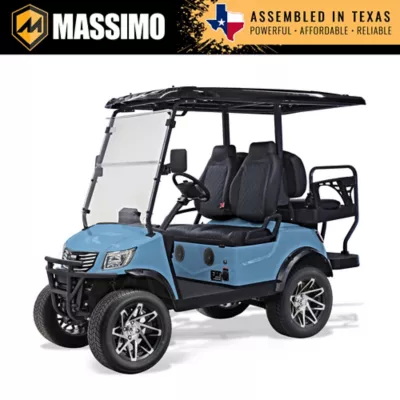Content Menu
● Introduction
● Understanding Electric Golf Carts
● Government Incentives and Tax Credits
>> Federal Tax Credits
>> State and Local Incentives
● Manufacturer Promotions and Financing
>> Zero-Interest Financing
>> Trade-In Programs
>> Seasonal Sales and Promotions
● Creative Financing Options
>> Lease-Back Programs
>> Advertising Opportunities
>> Community Sharing Programs
● Contests and Giveaways
>> Manufacturer Sweepstakes
>> Charity Events
>> Social Media Contests
● DIY and Conversion Options
>> Conversion Kits
>> Rebuilding Used Carts
● Networking and Community Resources
>> Golf Course Connections
>> Online Forums and Marketplaces
>> Local Classifieds
● Conclusion
● Related Questions and Answers
>> 1. Are electric golf carts street legal?
>> 2. How long do electric golf cart batteries last?
>> 3. What's the difference between an electric golf cart and a Low-Speed Vehicle (LSV)?
>> 4. Can I use an electric golf cart for purposes other than golfing?
>> 5. How much does it typically cost to charge an electric golf cart?
Introduction
Electric golf carts have become increasingly popular for both on-course and off-course use. Their eco-friendly nature, low maintenance costs, and versatility make them an attractive option for many. But what if you could get one for free? In this comprehensive guide, we'll explore various methods to potentially acquire a free electric golf cart, from government incentives to creative financing options.

Understanding Electric Golf Carts
Before diving into how to get a free electric golf cart, let's briefly discuss what these vehicles are and why they're so desirable.
Electric golf carts, also known as low-speed vehicles (LSVs) or neighborhood electric vehicles (NEVs), are battery-powered vehicles designed for short-distance transportation. They typically have a top speed of 20-25 mph and are street-legal in many areas for roads with speed limits up to 35 mph.
These vehicles offer several advantages:
- Environmentally friendly (zero emissions)
- Low operating costs
- Quiet operation
- Versatile use (golf courses, neighborhoods, campgrounds, etc.)
- Easy to maintain
Now, let's explore how you might be able to get one of these useful vehicles for free or at a significantly reduced cost.
Government Incentives and Tax Credits
One of the primary ways to potentially get a free electric golf cart is through government incentives and tax credits. Many jurisdictions offer financial incentives to encourage the adoption of electric vehicles, including LSVs and NEVs.
Federal Tax Credits
The U.S. federal government has offered tax credits for electric vehicles, including some golf carts that qualify as LSVs. While these credits have changed over time, they can significantly reduce the cost of an electric golf cart.
State and Local Incentives
In addition to federal incentives, many states and local governments offer their own rebates or tax credits for electric vehicle purchases. These can vary widely by location, so it's essential to research what's available in your area.
To find out about available incentives:
1. Check with your state's energy or environmental department
2. Visit the Database of State Incentives for Renewables & Efficiency (DSIRE)
3. Consult with a local electric vehicle dealer or tax professional
Manufacturer Promotions and Financing
Golf cart manufacturers and dealers often run promotions that can significantly reduce the cost of a new electric golf cart. While these may not make the cart entirely free, they can bring the price down substantially.
Zero-Interest Financing
Many manufacturers offer zero-interest financing options for qualified buyers. While you'll still need to pay for the cart, spreading the cost over time without interest can make it more affordable.
Trade-In Programs
If you have an old gas-powered golf cart, some dealers offer trade-in programs. This can substantially reduce the cost of a new electric model.
Seasonal Sales and Promotions
Keep an eye out for seasonal sales, especially during the off-season for golf in your area. Manufacturers often offer significant discounts during these periods to boost sales.

Creative Financing Options
While not technically "free," these creative financing options can make an electric golf cart much more affordable or even cost-neutral over time.
Lease-Back Programs
Some companies offer lease-back programs where you purchase the cart, then lease it back to the company for a set period. The lease payments can potentially cover the entire cost of the cart.
Advertising Opportunities
In some cases, businesses may be willing to pay for advertising space on your golf cart. If you live in an area with high foot traffic or frequent community events, this could be a way to offset the cost of your cart.
Community Sharing Programs
Some neighborhoods or communities have started electric vehicle sharing programs. While you might not own the cart outright, you could have access to one for free or at a very low cost.
Contests and Giveaways
While less reliable, contests and giveaways can be a way to potentially win a free electric golf cart.
Manufacturer Sweepstakes
Golf cart manufacturers sometimes run sweepstakes or contests where you can win a free cart. Keep an eye on their social media channels and websites for these opportunities.
Charity Events
Local charities or golf tournaments may raffle off electric golf carts as prizes. Participating in these events not only gives you a chance to win but also supports a good cause.
Social Media Contests
Follow golf cart manufacturers, dealers, and golf-related accounts on social media. They occasionally run contests where you can win golf carts or significant discounts.

DIY and Conversion Options
For those who are handy, converting an existing gas-powered golf cart to electric can be a cost-effective option.
Conversion Kits
There are kits available that allow you to convert a gas-powered golf cart to electric. While not free, this can be significantly cheaper than buying a new electric cart.
Rebuilding Used Carts
If you can find a non-functioning electric golf cart for free or very cheap, rebuilding it could be a cost-effective way to get an electric cart. This requires some technical knowledge but can be a rewarding project.
Networking and Community Resources
Sometimes, the best opportunities come through personal connections and community resources.
Golf Course Connections
If you're a frequent golfer, build relationships with the staff at your local course. They might know of opportunities to acquire used carts or special deals.
Online Forums and Marketplaces
Join online forums dedicated to golf carts or electric vehicles. Members often share deals, and you might even find someone giving away an old cart that needs some work.
Local Classifieds
Check local classifieds, both online and in print. Sometimes, people give away old golf carts for free to anyone willing to haul them away.
Conclusion
While getting a completely free electric golf cart may be challenging, there are numerous ways to significantly reduce the cost or potentially acquire one for free. By combining government incentives, manufacturer promotions, creative financing, and a bit of luck, you might find yourself cruising in an electric golf cart without breaking the bank.
Remember to always do your due diligence, read the fine print on any offers or contests, and consider the long-term costs and benefits of owning an electric golf cart. With persistence and creativity, you might just find yourself enjoying the perks of electric golf cart ownership at a fraction of the usual cost.

Related Questions and Answers
1. Are electric golf carts street legal?
Answer: In many areas, electric golf carts that meet certain safety requirements are street legal on roads with speed limits up to 35 mph. These are often classified as Low-Speed Vehicles (LSVs) or Neighborhood Electric Vehicles (NEVs). However, regulations vary by location, so it's essential to check your local laws.
2. How long do electric golf cart batteries last?
Answer: The lifespan of electric golf cart batteries depends on various factors, including usage patterns and maintenance. On average, lead-acid batteries last 4-6 years, while lithium-ion batteries can last 8-10 years or more. Proper maintenance and charging habits can significantly extend battery life.
3. What's the difference between an electric golf cart and a Low-Speed Vehicle (LSV)?
Answer: While many electric golf carts are designed primarily for use on golf courses, Low-Speed Vehicles (LSVs) are built to meet specific safety standards for on-road use. LSVs typically have additional features like seat belts, turn signals, and windshields, making them street legal in many jurisdictions.
4. Can I use an electric golf cart for purposes other than golfing?
Answer: Absolutely! Electric golf carts, especially those classified as LSVs, are versatile vehicles. They're commonly used in retirement communities, college campuses, large industrial complexes, and for short trips around neighborhoods. Many people use them for errands, social visits, or simply enjoying outdoor rides.
5. How much does it typically cost to charge an electric golf cart?
Answer: The cost to charge an electric golf cart is generally very low. On average, it costs about $0.50 to $1.00 per charge, depending on your local electricity rates. This translates to roughly $5-$10 per month for typical residential use, making electric golf carts very economical to operate compared to gas-powered vehicles.










































